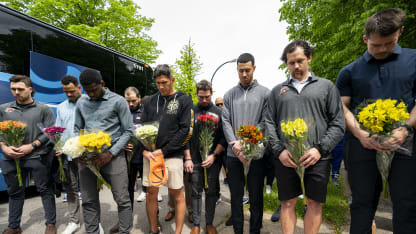Katrina Washington used to Uber to the Tops market on Jefferson Avenue from her job on Fillmore, a convenient stop to grab dinner for her two children on her way home from work.
Washington did not lose any friends or family members when a white supremacist walked into that Tops and killed 10 people last Saturday. But she felt like she did.
"It's been a lot of sadness. It's been just like an eerie feeling all over," Washington said Wednesday from the corner of Jefferson and Utica Street, one block north of the market. "… I was sad as if I lost someone, and I didn't."
Washington stopped and surveyed the scene around her, where players and staff from the Buffalo Bandits, Bills, and Sabres were serving free meals and chatting with members of the community.
"But I like this type of feeling," she said. "I like this."
'It really hit home' | Sabres join Bills, Bandits in supporting East Side
Kyle Okposo, Malcolm Subban, and Kevyn Adams volunteered alongside fellow local athletes



















